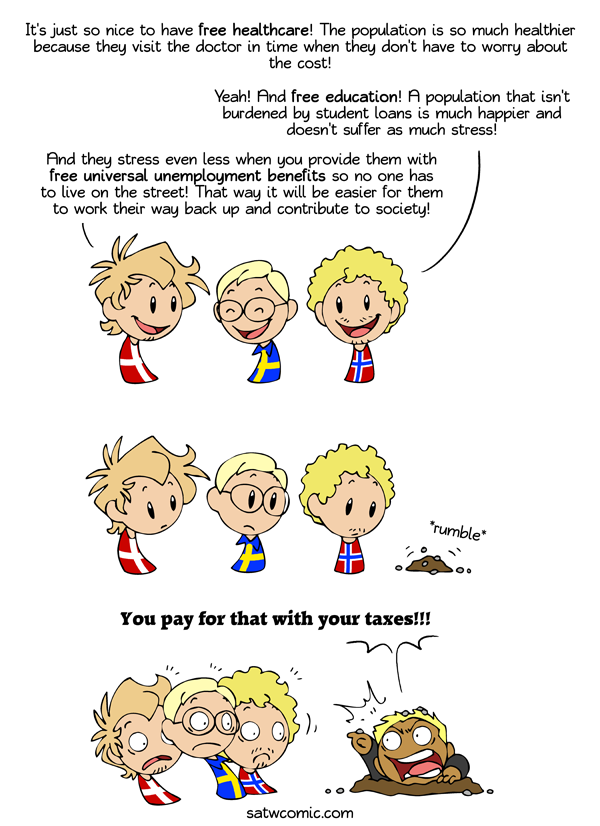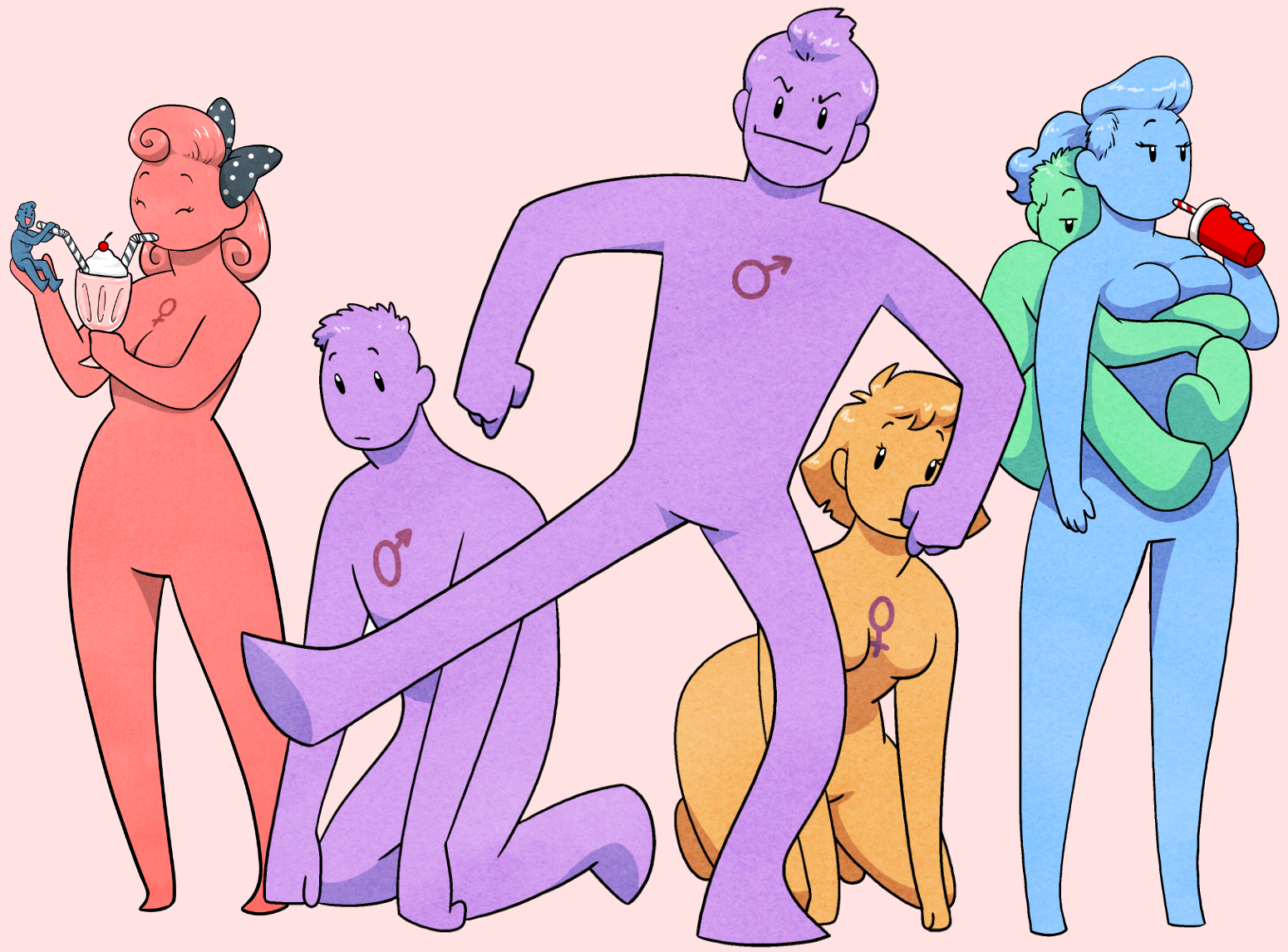
Every time
Every time someone talks about free this or that in the Nordic countries an American will pop his head up and yell "It's paid for with your taxes" without fail.
The thing about people not having to live on the street. Of course we have homeless people, but the system is such that you pretty much have to choose to live on the street. I once worked with a guy who also worked with homeless people and he told me that the people you see on the street are the ones who can't handle being part of society at all. The government doesn't want people to live on the street and there's help to be had, but some people just can't cope with modern life. Living in a house means you have responsibilities like bills and if you have a mental illness someone shows up at your place every week expecting you to take your pills, and that's too much for some people so they just leave. The guy didn't say any of this with any kind of judgment btw. He understood why some people might choose to turn their back on society.
I have friends and family with mental health problems who can't work and some can't be trusted to save money for bills, so the government make sure to put some of the money they receive every month aside for them so they can pay rent and won't have to go without heat or water. They try to keep a roof over everyone's head.
Norway America Sweden Denmark
2nd March 2018
8 years ago #9739211
18
0
Yes, we pay with taxes. This is a feature, not a bug. I don't get the outright frothing hatred of taxes that come from Americans. I get that they can be irksome at times, but the benefits of a well funded social safety net far outweigh the minor nuisance of losing a couple of currency units each month.
8 years ago #9739764
13
2
I'm sorry but...
...this is fucking beautiful.
I'm glad it works for the Nordics, and I wish that we here in the USA could get with the program. We always get to hear all of the damn excuses from the political Right, about why we can't or shouldn't do this, and in the end, it always boils down to one single, simple, ugly theme. When you strip away the pseudo-patriotic rhetoric, the cowboy mythology and the fantasy of American social mobility, what you have left is:
"I don't want to contribute to the society I derive direct benefit from, and which supports literally every aspect of the modern life I enjoy."
And of course, right now, some knee-jerk cretin who fancies himself to be either a cowboy or a capitalist is frothing at the mouth while his sympathetic nervous system is conjuring up irrational, half-informed, pseudo-intellectual, anachronistic poppycock with which to respond. It will involve some nonsense about "voluntary exchange" and attempt to resurrect the specter of the Soviet Union, while making demands of myself and others, that we think about whether or not we want a faceless bureaucrat dictating this or that to us. It will also completely ignore that the people of the United States already suffer under these conditions, and that the faceless dictator is in fact one of the unelected, unaccountable Wall Street set. This raging ball of antisocial entitlement will also declare that someone could choose to not have anything to do with "Our Way of Life", while simultaneously ignoring that every square inch of dirt in the US is owned, and that it is illegal in most places to sleep rough, hunt for food, build a campfire or even put together a shelter. In fact, in many places in the United States, it is becoming illegal to provide food to the homeless.
In short, Ladies and Gentlemen, the United States seems to be trying very, very hard to make poverty unavoidable, inescapable and illegal.
"Are there no Prisons? Are there no Workhouses?" Dickens would find modern America horrifically familiar.
...this is fucking beautiful.
I'm glad it works for the Nordics, and I wish that we here in the USA could get with the program. We always get to hear all of the damn excuses from the political Right, about why we can't or shouldn't do this, and in the end, it always boils down to one single, simple, ugly theme. When you strip away the pseudo-patriotic rhetoric, the cowboy mythology and the fantasy of American social mobility, what you have left is:
"I don't want to contribute to the society I derive direct benefit from, and which supports literally every aspect of the modern life I enjoy."
And of course, right now, some knee-jerk cretin who fancies himself to be either a cowboy or a capitalist is frothing at the mouth while his sympathetic nervous system is conjuring up irrational, half-informed, pseudo-intellectual, anachronistic poppycock with which to respond. It will involve some nonsense about "voluntary exchange" and attempt to resurrect the specter of the Soviet Union, while making demands of myself and others, that we think about whether or not we want a faceless bureaucrat dictating this or that to us. It will also completely ignore that the people of the United States already suffer under these conditions, and that the faceless dictator is in fact one of the unelected, unaccountable Wall Street set. This raging ball of antisocial entitlement will also declare that someone could choose to not have anything to do with "Our Way of Life", while simultaneously ignoring that every square inch of dirt in the US is owned, and that it is illegal in most places to sleep rough, hunt for food, build a campfire or even put together a shelter. In fact, in many places in the United States, it is becoming illegal to provide food to the homeless.
In short, Ladies and Gentlemen, the United States seems to be trying very, very hard to make poverty unavoidable, inescapable and illegal.
"Are there no Prisons? Are there no Workhouses?" Dickens would find modern America horrifically familiar.
8 years ago #9739959
12
4
USA: I will not adopt your system!
Sweden: Well, don't, then. It's your choice.
USA: Don't try and force it on me!
Norway: We're not trying anything. Leave us alone, please.
USA: It would never work here!
Denmark: I agree, it probably wouldn't. Now leave us alone.
USA: I will never adopt your system!
Sweden: You already said that, and that's fine by us.
USA: And you're not taking away my guns!
Norway: We're not trying to. Leave us alone.
USA: FINLAND!!! DON'T YOU TRY AND TAKE AWAY MY GUNS! I LOVE MY GUNS!
Finland: I've noticed. Hi guys, what's up?
USA: Leave my guns alone!
Finland: (annoyed) Fine! Keep your stupid guns, I don't care! (to the Nordics) What's up?
Sweden: We were thinking of hosting a Max von Sydow -movie marathon, and--
USA: Your system will never work for us!
Norway: We know that! Now fuck off!
USA: Finland! I will not adopt your school system!
Finland: That's your choice. Max von Sydow, huh? Can we watch "Hour of the Wolf"?
USA: Quit sending teachers to my schools, then!
Finland: Dude, YOU have sent teachers to MY schools, not the other way round!
USA:........I WILL NEVER ADOPT YOUR STUPID COMMIE, SOCIALIST, FREEDOM-HATING, HOMOSEXUAL, ATHEIST, FEMINIST, MONEY-HATING, GUN-GRABBING SYSTEEEEEMMMM!
***thirty minutes later***
Doctor: How's Brother America?
Nurse: Not good, doctor. He's got Sweden's hand wrapped around his throat, a live cod and Lego blocks stuffed in his ears, and a bottle of Finlandia rammed up his arse.
Sweden: Well, don't, then. It's your choice.
USA: Don't try and force it on me!
Norway: We're not trying anything. Leave us alone, please.
USA: It would never work here!
Denmark: I agree, it probably wouldn't. Now leave us alone.
USA: I will never adopt your system!
Sweden: You already said that, and that's fine by us.
USA: And you're not taking away my guns!
Norway: We're not trying to. Leave us alone.
USA: FINLAND!!! DON'T YOU TRY AND TAKE AWAY MY GUNS! I LOVE MY GUNS!
Finland: I've noticed. Hi guys, what's up?
USA: Leave my guns alone!
Finland: (annoyed) Fine! Keep your stupid guns, I don't care! (to the Nordics) What's up?
Sweden: We were thinking of hosting a Max von Sydow -movie marathon, and--
USA: Your system will never work for us!
Norway: We know that! Now fuck off!
USA: Finland! I will not adopt your school system!
Finland: That's your choice. Max von Sydow, huh? Can we watch "Hour of the Wolf"?
USA: Quit sending teachers to my schools, then!
Finland: Dude, YOU have sent teachers to MY schools, not the other way round!
USA:........I WILL NEVER ADOPT YOUR STUPID COMMIE, SOCIALIST, FREEDOM-HATING, HOMOSEXUAL, ATHEIST, FEMINIST, MONEY-HATING, GUN-GRABBING SYSTEEEEEMMMM!
***thirty minutes later***
Doctor: How's Brother America?
Nurse: Not good, doctor. He's got Sweden's hand wrapped around his throat, a live cod and Lego blocks stuffed in his ears, and a bottle of Finlandia rammed up his arse.
8 years ago #9739199
12
0
In my opinion, the reason why so many Americans are quick to point out that free healthcare, education etc. isn't free, but paid for through taxes, is that they misunderstand the meaning of the word 'free'. They think we mean 'free of cost', but what we mean is of course 'freely available'.
The further benefits of universal healthcare and education, are of course incidental, though they make good arguments in favour.
The further benefits of universal healthcare and education, are of course incidental, though they make good arguments in favour.
8 years ago #9741225
10
0
My father is Danish, and he honestly did not like the Danish way of governing. My parents lived in Denmark for a while in the mid-1970's, and my mother told me a story of how one morning he threw his paper down in rage and said "I'm paying enough for three other families!" He had dreamt of coming to America since he was a kid, so first chance he had to get out of Denmark, he was off.
My mom (who was from Birmingham, Alabama, USA) absolutely hated Denmark so much she actually left my dad over it and moved back to Alabama for a while until my Dad put in a transfer to Hong Kong where they got back together again and I was born in 1977.
My brother and I of course LOVE Denmark. We got to see our grandparents and have fun at Tivoli and Bon-Bon Land, and the Little Mermaid both with and without her head. My favorite memory was trying to chase pindsvins through the hedges! XD
My Dad received his citizenship to become an American in 1998. It was a proud, proud day for us all. Dad's lifelong dream came true.
I wish this story had a happy ending. My parents divorced when I was 11. At the end of her life, my mother sat with a broken back for 7 months that would not heal and with no medical care. She eventually killed herself in 2008. We lost our family home of 30 years being forced to pay back the state for her medical care. I've been homeless. I still have nightmares about it.
My father is currently 79 years old and sitting in an old folks home with severe dementia and can no longer speak. We his children are slowly being bled dry paying for all the care he needs.
I would like to stress that I consider us INCREDIBLY lucky to have at least had some resources to mitigate all this compared to many we know.
Years ago when W. Bush was still in office and before he lost his ability to speak, I was talking to my dad about how bad health care here was here in America and talking about how scared I was about what we were going to do for him when it came his time. I asked him in light of this if he was ever sorry he left Denmark or if he had the choice, would he go back? He shook his head and said, "No. Not in the slightest. I still feel I made the right decision and I'm still very happy to be an American."
So as his light fades, I try to take my own tiny place in American history by talking to people (including my state representatives) with the unique insight I've been gifted from the two countries I consider home.
My mom (who was from Birmingham, Alabama, USA) absolutely hated Denmark so much she actually left my dad over it and moved back to Alabama for a while until my Dad put in a transfer to Hong Kong where they got back together again and I was born in 1977.
My brother and I of course LOVE Denmark. We got to see our grandparents and have fun at Tivoli and Bon-Bon Land, and the Little Mermaid both with and without her head. My favorite memory was trying to chase pindsvins through the hedges! XD
My Dad received his citizenship to become an American in 1998. It was a proud, proud day for us all. Dad's lifelong dream came true.
I wish this story had a happy ending. My parents divorced when I was 11. At the end of her life, my mother sat with a broken back for 7 months that would not heal and with no medical care. She eventually killed herself in 2008. We lost our family home of 30 years being forced to pay back the state for her medical care. I've been homeless. I still have nightmares about it.
My father is currently 79 years old and sitting in an old folks home with severe dementia and can no longer speak. We his children are slowly being bled dry paying for all the care he needs.
I would like to stress that I consider us INCREDIBLY lucky to have at least had some resources to mitigate all this compared to many we know.
Years ago when W. Bush was still in office and before he lost his ability to speak, I was talking to my dad about how bad health care here was here in America and talking about how scared I was about what we were going to do for him when it came his time. I asked him in light of this if he was ever sorry he left Denmark or if he had the choice, would he go back? He shook his head and said, "No. Not in the slightest. I still feel I made the right decision and I'm still very happy to be an American."
So as his light fades, I try to take my own tiny place in American history by talking to people (including my state representatives) with the unique insight I've been gifted from the two countries I consider home.
8 years ago #9739184
10
2
USA: All taxes bad! Your taxes are too high.
Europe: But the benefits are worth it.
USA: No! All taxes bad!
Europe: But actually, we end up saving money in the long run because—
USA: NONONO!!! ALL TAXES BAD!!!!! BADBADBAD!!!!!
Europe: (sigh)
Europe: But the benefits are worth it.
USA: No! All taxes bad!
Europe: But actually, we end up saving money in the long run because—
USA: NONONO!!! ALL TAXES BAD!!!!! BADBADBAD!!!!!
Europe: (sigh)
8 years ago #9739160
9
1
Hey, those taxes could go towards something USEFUL!
The president needs to pay for his golf trips somehow!
The president needs to pay for his golf trips somehow!
8 years ago #9739743
8
4
Because people here seem to be concerned more with their own bottom line. "I have mine, fuck the rest" is basically the motto of the GOP. They're also too stubborn to admit that the amount their taxes would go up to improve society the same way Nordic countries do would more than likely if not assuredly lower their own personal expenses by more than that increase.
Some of us actually realize that it's possible to move forward. But it's hard when the people who don't are the ones in power.
Some of us actually realize that it's possible to move forward. But it's hard when the people who don't are the ones in power.
8 years ago #9739843
7
2
You could also see it as people who don’t want universal healthcare and education wants a sicker and dumber population since they want to limit the amount of people who can get the healthcare and education they need. In other words, if you don’t want freely available universal healthcare and education for your people then you’re intentionally harming your own country which makes you a traitor.
Add comment: Please Sign in or create an accout to comment.



 Support the comic on
Support the comic on 








































The Nordic welfare state is basically not more complicated then a huge insurance policy.
Your taxes is you insurance payment, and for that you're basically insured against anything that can happen you personally.
This obviously works because EVERYONE pays - and according to ability. Which means that yes, the very, very rich pays a lot more in absolute figures - probably more then they will ever get back, unless they get a particularly nasty disease.
So many of the very, very rich doesn't like this system obviously - because they are the only one's rich enough to be able to pay for all of these things out of pocket themselves.
But for everyone else, it's a completely rational insurance policy - because we can all get that particularly nasty disease, or be hit with other misfortunes in life, and most of us wouldn't have a chance to cope with that financially.
Which of course is why you have insurance in America as well - but you have to pay that privately.
The big difference here is that our welfare insurance policy covers much, much more then any policy in the US does (you don't have policies covering your children's college education, do you?) - but also that our policy actually pays out when you need it.
The welfare state isn't there to make a profit off of you and it doesn't try to trick you with complicated terms or refuse to pay out when you end up needing the insurance.
Because the system is not based on a short-term profit calculation, like a private insurance company in the US is - but on long-term national benefits.
For instance:
It's a benefit to the whole nation that everyone can get the highest level of education they're suitable for - as a more well educated work force benefits the economy as a whole, and thus the nation as a whole.
With a higher general level of education, more specialized and advanced products and services can be made and offered, providing greater export profits, higher company profits and in the end higher tax payments from these companies back to the nation.
The citizen getting that higher level of education and that more specialized job, is also likely to be earning more in that job - meaning that he/she will be paying back more in taxes for decades to come to the nation.
So the investments the nation makes in the individual often pays of many times over, over their whole life.
The simple fact is, that from a national economic point of view, the socialist principle "From each according to his ability, to each according to his needs" actually works out very well.
If that hadn't been the case - none of the Nordic nation would obviously have succeed as well as we did, with this system.
(Well except Norway, who could probably live off the sale of it's oil alone for the rest of any of our lives, those rich bastards... ;-))
We all need a hand in life at some point - and if we return that favor when we are in a stronger position - that actually strengthen the nation as a whole.
Not only economically, but also in terms of social cohesion.
Most people happily pays into the system, because they appreciate the security the systems gives them, knowing that no matter what happens, they have this insurance. And if they're happy enough to not need that much help themselves - it will still be there for their children, and grand-children, and other people they love and care for - when they need it.
That's not to say there aren't people whining loudly about having to pay tax of course - both amongst the few very, very rich who actually could opt-out of the system entirely - but also amongst the many more who actually benefit from it.
But then there are always stupid and cheap people of course, who won't acknowledge anything they themselves received, but instead pretend all they've ever done is pay into the system.
But as I usually tell them - counting from their free delivery when they where born, through every free doctors visit, through their free daycare and free education - by the time they're around 18 and can start to fend for themselves, the average citizen has already cost the nation the equivalent of hundreds of thousands of US dollars.
Every penny in tax you pay for years to come from then as an average earner is just to pay back what you've already gotten for free.
And that's assuming you didn't have more then the average health problems growing up.
But still, some people will always whine whenever they have to pay anything of course.